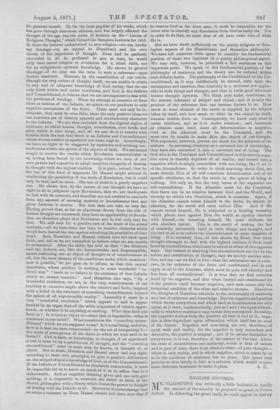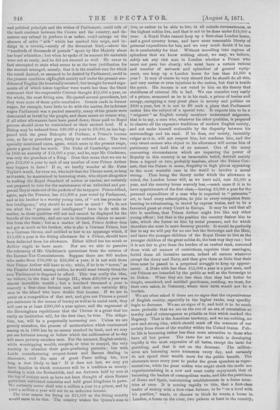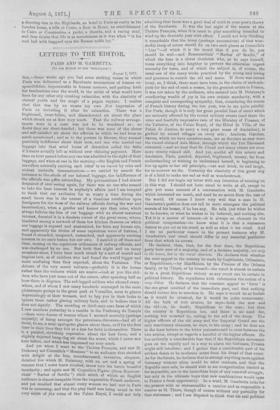ENGLISH INCOMES.
MR. GLADSTONE was evidently a little bothered to justify the amount of the annuity he proposed to grant to Prince Arthur. In defending the grant itself, he could appeal to history
and political principle and the wishes of Parliament, could talk of the tacit contract between the Crown and the country, and de- nounce any refusal to perform it as unfair, could enlarge on the absence of extra " aids" which has marked this reign, and in- dulge in a reverie,—surely of the dreamiest kind,—about the "hundreds of thousands of pounds" spent by Her Majesty about her boys' education ; but when he spoke of its amount his materials were not so ready, and he did not succeed so well. He never in fact attempted to state what seems to us the true justification for the amount arranged, namely, that it is the smallest sum for which the result desired, or assumed to be desired by Parliament, could in the present condition of/English society and under the present con- ditions of English life be actually secured; but brought forward argu- ments all of which taken together were worth less than the blank statement that the responsible Cabinet thought 215,000 a year, on the whole, the most fitting sum. Ile quoted several precedents, but they were none of them quite conclusive. Grants made in former reigns, for example, have little to do with the matter, for in former reigns Parliament was a packed assembly, many of the grants were denounced as lavish by the people, and there seems no reason why, if all other allowances have been pared down, those paid to Royal princes should alone be maintained at their ancient level. If a Bishop may be reduced from 180,000 a year to £8,000, as has hap- pened with the great Bishopric of Durham, a Prince's income may, as far as precedent goes, fairly be reduced also. The two specially mentioned eases, again, which arose in the present reign, prove a great deal too much. The Duke of Cambridge received in 1850 an annuity of 212,000 a year, and he, says Mr. Gladstone, was only the grandson of a King. Does that mean that we are to give 112,000 a year to each of any number of sons Prince Arthur may happen to have ? If so, we hardly wonder at Mr. Peter Taylor's wrath, for even we, who hold that the Throne must, so long as it exists, be maintained in becoming state, who object altogether to making the Royal Standard of cotton or canvas, are certainly not prepared to vote for the maintenance of an unlimited and per- petual Royal caste out of the pockets of the taxpayer. Prince Alfred, again, says the Premier, has 215,000 a year voted by Parliament, and as his brother is a worthy young man, of " not less promise or less intelligence," why should he not have as much? We do not see what the " promise and intelligence" have to do with the matter, as those qualities will not and cannot be displayed for the benefit of the country, and are not in themselves claims to annui- ties from the State ; but as a matter of fact, Prince Arthur does not get as much as his brother, who is also a German Prince, heir to a German throne, and entitled as heir to an appanage which, if 215,000 a year is the fitting allowance for a Prince, should have been deducted from hie allowance. Either Alfred has too much or Arthur ought to have more. Nor are we able to perceive the relevancy of Mr. Gladstone's quotations from the returns of the Income-Tax Commissioners. Suppose there are 800 traders who make from 210,000 to 2.50,000 a year, it is not with them that Prince Arthur will have to vie ; while, if he is to "tower," as the Premier hinted, among nobles, he would want twenty times the sum Parliament is disposed to afford. This was really the idea, we believe, in the time of George III., when .220,000 a year was almost incredible wealth ; but a hundred thousand a year is scarcely a first-class fortune now, and there are certainly fifty men in the island who have double that income. If we are to enter on a competition of that sort, and give our Princes a proud pre-eminence in the means of luxury as well as in social rank, they will cost us at least 2.200,000 a year apiece, and the argument of the Birmingham republicans that the Throne is a great deal too costly an institution will, for the first time, be true, The obliga- tion, too, will be a perpetually increasing one. Unless we are greatly mistaken, the process of accumulation which commenced among us in 1800 has by no means reached its limit, and we may yet see fortunes among us before which the millionaires of to-day will seem poverty-stricken men. For the moment, English society, while worshipping wealth, compels, or tries to compel, the very wealthy to abandon their gain-producing pursuits ; but with Lords manufacturing croquet-boxes and Barons dealing in discounts, and the sons of great Peers selling tea, how long is that likely to last ? If it does not last, we may yet have families in which commerce will be a tradition as money- dealing is with the Rothschilds, and see fortunes held by men at the top of society such as have not been thought of since Roman patricians cultivated coUntries and held great kingdoms in pawn. We certainly never shall vote a million a year to a prince, and by 1900 a million a year will not be an unknown income. The true reason for fixing on 215,000 as the fitting annuity would seem to be this. The country wishes the Queen's sons to live, or rather to be able to live, in all outside circumstances, as the highest nobles live, and that is not to be done under 2.15,000 a year. A Royal Duke cannot keep up a first-class London house, and a good country house, and have some reasonable liberty of personal expenditure for loss, and we very much doubt if he can do it comfortably for that. Without travelling into regions of splendour that we know nothing about, we may, we believe, safely ask any rich man in London whether a Prince who must not pare too closely, who must have a certain retinue and number of servants and splendour of general equip- ment, can keep up a London house for less than 26,000 a year? It may of course be very absurd that he should do all this, and very useless or even injurious to the nation, but that is beside the 'point. His income is not voted to him on the theory that stateliness of external life is bad. We can conceive very easily of a prince, armoured as he is in his rank, a prince of brains and energy, occupying a very great place in society and politics on 1800 a year, but it is not to fill such a place that Parliament makes him the subject of a special vote. It expects him to be a " seigneur " as English county members understand seigneurs, that is to say, a man who, whatever his other qualities, is prepared to observe all the expensive traditions of modern English society, and not make himself noticeable by the disparity between his surroundings and his rank. If he does, our society, incurably vulgar as it is, will not respect him, but condemn him, and the very street orators who object to his allowance will accuse him of parsimony and hold him of no account. One of the many concurring circumstances which are impairing the power of Royalty in this country is an immovable belief, derived mainly from a legend or two, probably baseless, about the Prince Con- sort, that the Palace is mean, frugality in high places appearing to the most wasteful race in the world to involve a moral' wrong. That being the theory under which the allowance is voted, the London house will, as we have said, cost 26,000 a year, and the country house scarcely less,—much more if it is to have appointments of the first class,—leaving 23,000 a year for the personal expenditure of a man who is expected to "patronize art, to head every subscription, to join in every occupation from hunting to volunteering, to travel by express trains, and to be a favoured guest at every Court in Europe. It may be said that all this is needless, that Prince Arthur might live like any other young officer ; but that is the position the country desires him to take, which she forces on him by social pressure, and for which therefore she must in mere decency provide. It would be perfectly fair to say we will pay for no one but the Sovereign and the Heir, and leave the younger children of the Royal House to live as the younger children of the great nobles do, the best way they can ; but it is not fair to give them the burden of an exalted rank, surround' them with all manner of restrictions, regulate their marriages, forbid them all lucrative careers, indeed all careers whatever except the Army and Navy, and then give them so little that their lives must be passed in a perpetual struggle to keep up appear- ances. A Duke with less than 115,000 a year is a poor man, and our Princes are intended by the public as well as the Sovereign to be Dukes. When they are less than that they had better ber simple, unnoticed, and untitled gentlemen, residing, we trust, for their own sakes, in Germany, where their birth would not be a burden.
We are often asked if there are no signs that the expensiveness of English society, especially in the higher ranks, may speedily begin to decrease. We see no signs of it, and hold it to be much. more probable that we are on the eve of an era of ostentation as tawdry and of extravagance as pitiable as that which marked the Regency. That is the American tendency, and we see nothing, no new and strong idea, which should mark off the manners of our society from those of the wealthy within the United States. Pub- lic life is becoming rather less than more attractive to those who, have all but power. The taste for art which is developing rapidly is the most expensive of all tastes, except the taste for gambling, and that is not on the decrease. The million- aires are becoming more numerous every day, and certainly do not spend their wealth more for the public benefit. The electorate seem every year to prefer the great spenders as repre- sentatives, while the great nobles who might check the mode are experimentalizing in a new and most costly enjoyment, that of becoming the leaders of cosmopolitan waste, and like the patrician- of Rome and Spain, maintaining establishments in a dozen coun- tries at once. It is coming rapidly to this, that a first-class leader of society with a first-class fortune, to be "on a level with his position," wants, or chooses to think be wants, a hone in London, a house on the liver, two palaces at least in the country, a. shooting-box in the Highlands, an hotel in Paris as costly as his Loudon house, a villa at Como, a floor in Rome, an establishment in Cairo or Constantine, a yacht, a theatre, ancl a racing stud, and then thinks that life is as monotonous as it was when " in his cool hall with haggard eyes the Roman noble lay."


































 Previous page
Previous page